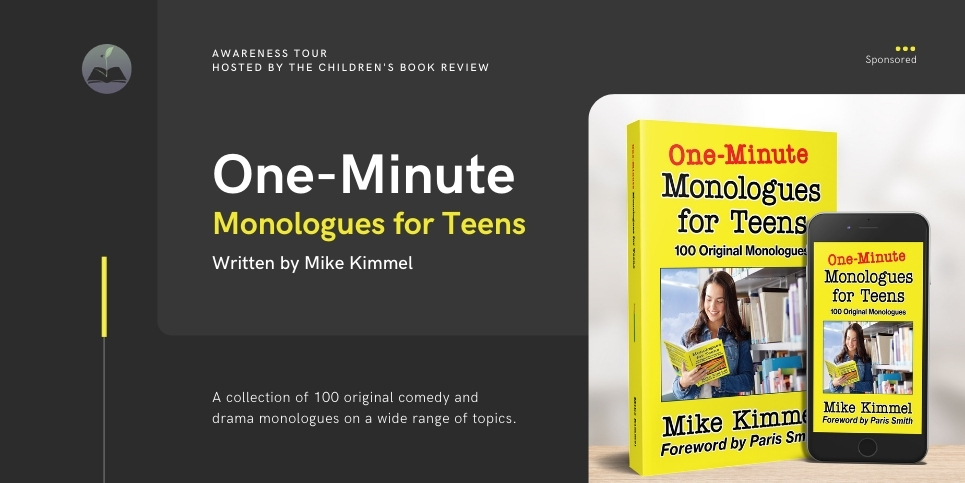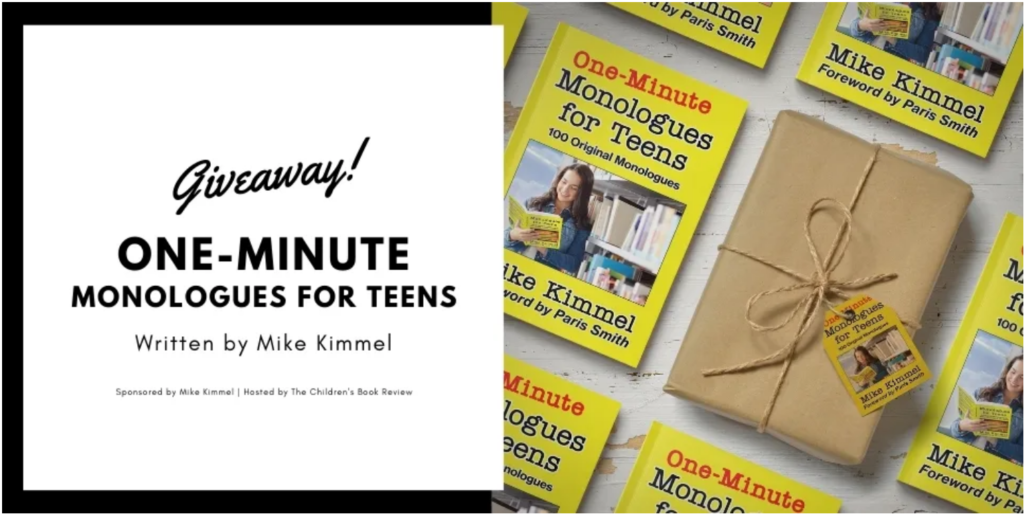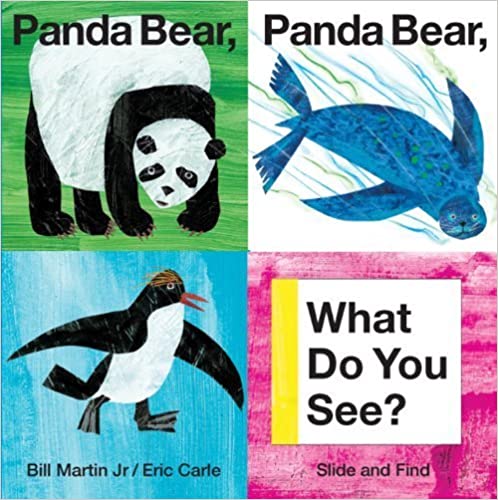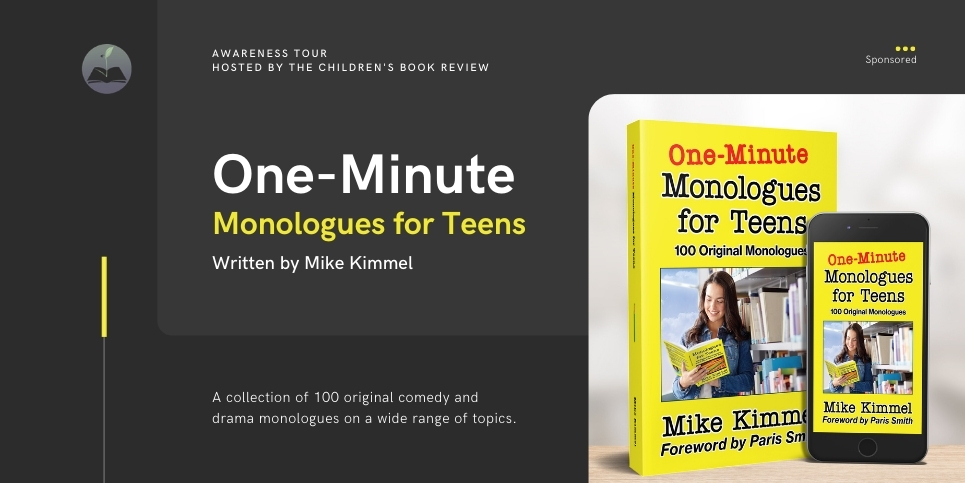
Welcome, everyone! Today, in partnership with The Children’s Book Review, we have an exciting interview with author, Mike Kimmel. His new book, ONE-MINUTE MONOLOGUES FOR TEENS is out now, and you can win a copy below! Read on to find out about Mike, his book, and how you can win a prize pack that includes online acting lessons!
What’s the book about, you ask? Let’s take a look at the Publisher’s synopsis…
One-Minute Monologues For Teens: 100 Original Monologues
Written by Mike Kimmel
Publisher’s Synopsis: Need a killer monologue for an audition? Discover a wealth of fresh options in this detailed tome.
Sick of the same scripts being done to death? Looking for a soliloquy relevant to teenagers? Seeking material with a positive spin? Full voting member of the National Television Academy and Tonight Show sketch performer Mike Kimmel has been writing, acting, and producing for decades. Now he’s here to share a curated collection of one hundred of the best comedy and drama monologues.
One-Minute Monologues for Teens is the ultimate volume of family-friendly stage material to help you nail that college drama program audition or class assignment. With a range of topics applicable to young actors, these pieces require no costumes or props, and discuss ethical questions perfect for middle- and high-school minds to explore. And with literally dozens of gender-neutral and unique scenes to choose from, you’ll find the right piece to take you from zero to callback in no time at all.
One-Minute Monologues for Teens is the dramatic arts advantage you need in your next live performance. If you like fresh material, optimistic spins, and challenging ideas, you’ll love Mike Kimmel’s definitive resource.
Ages 13+ | Publisher: Ben Rose Creative Arts | ISBN-13: 978-0998151380
Ready to buy now?
Amazon: https://amzn.to/322JAh1
Bookshop.org: https://bookshop.org/a/2078/9780998151380
As if you needed more reason to get your copy of this amazing book, today, here’s an interview with stellar author and experienced acting coach, Mike Kimmel!
INTERVIEW with Mike Kimmel!
Hello, and welcome to Prologue! We’re so excited to have you here today, in partnership with The Children’s Book Review!
Let’s learn about you, your book, and what readers can expect from ONE-MINUTE MONOLOGUES FOR TEENS.
Tell us about yourself and your background and how it influenced you in creating this book?
I’ve been an actor on stage and screen for many years and have also had the opportunity to coach actors of all ages – child, tween, teen, and adult. I’ve known since childhood that I wanted to be an actor. As a kid, I can vividly remember searching my school, public libraries, and bookmobiles for information on how to get started. I was never able to find materials that I could completely connect with – and so I never had the opportunity to become a child actor myself. I grew up in a very modest neighborhood in the Bronx, New York. There was never money for anything except the bare necessities. Things were a lot different back then too. At that time, there were no arts programs or after-school centers for kids to explore their outside interests like there are today. Consequently, I didn’t get started in the entertainment industry until I was in my twenties.
In 2012, I decided to create a series of books that would simplify and demystify the acting, memorizing, rehearsing, and performance processes for young people. I wanted to write the books I was looking for on those library shelves when I was a kid. I wanted to write the books I hoped to receive as birthday presents back then. Looking back, I would have benefitted tremendously from this series of simple, uncluttered instructional books. They would have helped me get started earlier rather than later.
How do you select monologues? Do you pay special attention to wit or tone, perhaps what’s more recent or more classical works?
These are all original, contemporary pieces and grew out of real life, practical settings, attitudes, and ideas. Even though I’m well past my teens, I can still remember what I wanted and needed at that stage in my own life. There’s an old saying: “Be who you needed when you were young.”
As a young person, I wanted guidance on finding an effective starting point in the Performing Arts. I never found it. As an experienced actor today, with many years of New York and Hollywood credits, I try to look at the world and keep a young person’s perspective in mind. For example, if I find myself getting annoyed or irritated with a situation out in the world, I stop and think about how much more challenging that situation would be for a younger person – who hasn’t yet developed adult coping skills. If a store clerk is rude to me, I imagine what it would be like to be a teenager working at my first after-school job with that person. If someone cuts me off in traffic, I imagine myself as a teenager driving alone for the first time with my brand new learner’s permit. This exercise always opens the door to a scene or monologue from a teenager’s perspective.
Who would find these monologues helpful? What about your book stands out from other compilations of monologues?
When I first started teaching young actors, I was appalled at the vast majority of mean-spirited, snarky, argumentative, over-the-top material that seemed to be so pervasive in young actor training. I knew that young people deserved better – and I felt that my many years of practical experience in acting and auditioning had prepared me to make a strong and substantive contribution to the entertainment industry and the training of young performers. I focus on creating scenes and monologues that are natural and conversational – without any over-the-top dialogue or scenarios. I call it “real-world performance material” and try to write in such a way that the scenes and monologues will be of optimum benefit to young people walking into audition situations with casting directors, directors, and producers.
What’s your favorite monologue of all time? And what is your favorite in the book, and why?
That’s a great question! Some of them are very personal and deal with experiences I’ve encountered firsthand. A few others are fictionalized snapshots from my own family and close friends’ history. Several of the dramatic pieces really hit home for me. Those are Great-Grandfather’s Jacket, Frame of Reference, and You’re Dangerous.
The Opposite of Thank You is lighter in tone but is another personal favorite. It’s a monologue thanking people for their acts of omission – for all the negative actions and bad behavior they choose to avoid. It grew out of a longtime joke I would make with students in my classes and private coaching sessions – thanking people not only for the good things they do but also for the bad things they don’t do. I call that “The Opposite of Thank You.”
How do your monologues help teens create positive attitudes and behaviors, and how do these monologues start those tough conversations (while still being family-friendly)?
We can’t change the external events that happen to us, but we can change how we react to those outside influences. We can’t control the world, so we must learn to control ourselves. This is especially important for artists who tend to be a little more emotional than others in society. Focusing on positive outcomes and placing the best possible meaning on other people’s actions is an incredibly valuable skill for actors of all ages.
I also think the most important question we can ask is, “why.” “Why” helps lead us to a greater understanding of the characters we portray. “Why” helps us discover underlying truths about a character’s motivations and prior history. I like to remind acting students that a character in a script didn’t just pop into existence on the day you’re reading that role aloud. Every character has a unique, complicated history. Studying the character’s motivations – and asking why – helps us find layers, nuances, and depth of meaning that bring each role to life powerfully and dynamically. I believe when actors can’t find something interesting and unique in the characters on the page, then they’re just not digging deep enough. There are no boring characters out there. It’s an actor’s job, however, to find the most interesting parts and show them off to the world.
What’s your writing process? Did you have outside opinions while creating this book, or did you solely choose what spoke to you as an artist?
I believe it’s important for artists to trust their personal creative process. Sometimes this takes longer than we would like, but there are times when the process simply should not be rushed. My first book, Scenes for Teens, took three years to complete. That was much longer than I expected, but I didn’t have a proper frame of reference because it was my first book. We all must find techniques to overcome our procrastination and inertia. Through sticking with the process – and trusting that I would eventually finish that first book – I’ve been able to complete six additional books in the entertainment industry since 2014. The way I’ve been able to accomplish that is to work on three different books at a time. Whenever I would get stuck – and writers always get stuck somewhere in the process – I could move on to another book for a different age group. I work like an ant. Little by little is my process … one page at a time, two cups of coffee at a time, three books at a time. This has been a method that’s worked well so far.
Additionally, I’m blessed to have a small group of close friends and colleagues in the industry that I trust implicitly. These are people I’ve worked with through the years who have proven themselves in real-world film, TV, and stage venues over and over again since I’ve known them. If I have a question I can’t answer, I can go to one of them and they’ll help me hammer out the details until an answer becomes clear. One thing I’ve learned in the entertainment industry is that this is a collaborative business – and there is absolutely no substitute for real-world, practical experience when it comes to problem-solving.
Besides the monologues themselves, can you give us a taste of any other tips or tricks readers will learn from your book?
Yes, if you believe what you’re saying, your audience will believe it too. If you learn to recite dialogue a stranger has written for you and speak out those words as though they were words, sentences, thoughts, and ideas you’ve created in your own mind – then you will speak with authenticity. When you truly believe the words you’re saying are your own, you’ll gain greater confidence in yourself as an actor and artist. This is the most effective way to get cast in professional projects, by the way. When you demonstrate confidence – not arrogance, but confidence – you will give directors and producers confidence in hiring you. I always want to help acting students prepare themselves for being hired in professional stage and screen productions. I’ve never believed in performing inside a vacuum or bubble. It has to be practical to be effective. I like to help train actors for success – and break down the auditioning and performing processes into achievable small steps to give them the skills and confidence they’ll need to get hired in the real world, build their resumes, and ultimately build their careers.
Have you been able to work with students using this book and your selected monologues, and if so, how did it go? What was it like seeing your selections acted out?
Yes, and it’s been a thrill to see and hear acting students of all ages work with the monologues in this book. Though the book is intended for teenagers, the monologues can also be used by adult actors. Many are also appropriate for younger kids. I try to write the monologues so that if the central idea appeals to an actor in a different age range, the script can be quickly and easily adapted for that actor by changing a word or two. A teenager might have a younger or older sibling who reads the book. Maybe a parent becomes interested too. I want the monologues to be accessible to all those different age ranges.
Are you working on anything new that readers can start getting excited about?
Yes, my next project is a new book of scripts for younger kids, ages 6 through 12. It’s a follow-up to one of my earlier books and is written in the same style and format. I’m hoping to have it finished and available for readers in January of 2021.
What’s your favorite play and movie?
I’m a huge Charlie Chaplin fan and believe there will never be another genius in his caliber and magnitude in the entertainment industry. Chaplin was not only the number-one box-office star in the world, but he wrote and directed the films he performed in. Believe it or not, he also wrote the music. He taught himself to play the violin. How many people have you met in your life who ever did that?
I like all of Chaplin’s work. One of his films, in particular though, Modern Times, is hands-down my favorite. I believe this film is just about perfect. I have two other favorite movies that I also believe are very close to perfect – Casablanca, starring Humphrey Bogart and Ingrid Bergman, and Francis Ford Coppola’s early masterpiece, The Godfather. I had an opportunity to work with Mr. Coppola a few years back, and it was definitely a career highlight.
Theatrically, my favorite play is Eugene O’Neill’s The Hairy Ape. It’s a little obscure. It’s also a difficult play to stage, so it isn’t performed often. O’Neill was a master at creating rich, multi-layered characters living in rough, blue-collar settings. It’s the world he grew up in and knew well. It’s also the world I grew up in and still remember well. I‘ve always wanted to play Eugene O’Neill’s title role in The Hairy Ape on Broadway. That would be my dream role.
Thank you so much for joining us, Mike! It was a pleasure to have you today on Prologue!
Thank you very much for this opportunity to connect with your readers. Keep doing what you’re doing. You are much appreciated.
And now, it’s GIVEAWAY time! Check out the offer below before you leave!
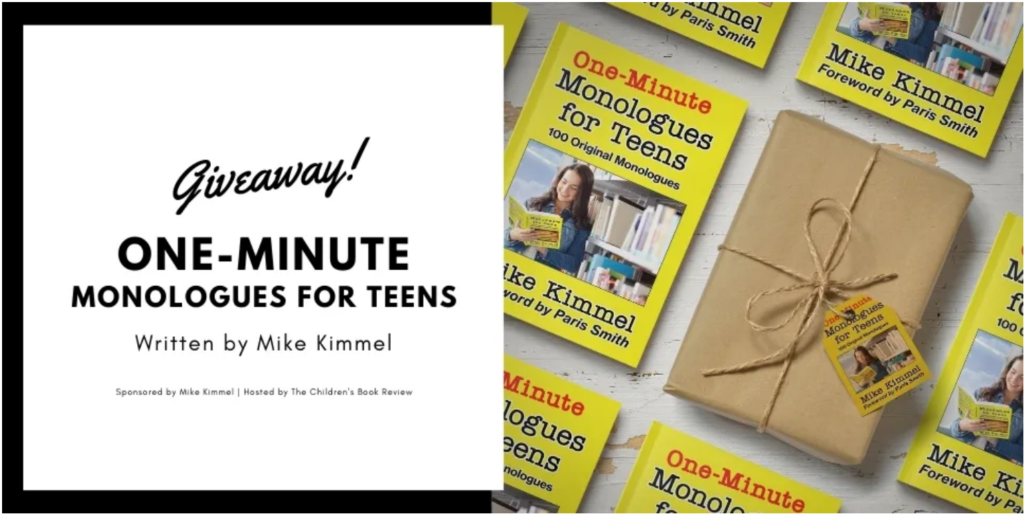
Enter for a chance to win a copy of One-Minute Monologues For Teens, autographed by Mike Kimmel, and three months of online acting classes!
One (1) grand prize winner receives:
- A copy of One-Minute Monologues for Teens, autographed by Mike Kimmel
- A copy of Monologues for Kids and Tweens, autographed by Mike Kimmel
- Three (3) months of online group acting classes* from Mike Kimmel for a recipient age 12 and up
- Be written into an upcoming monologue in a book by Mike Kimmel
Five (5) winners receive:
- A copy of One-Minute Monologues for Teens, autographed by Mike Kimmel
The giveaway begins November 4, 2020, at 12:01 A.M. MT and ends December 4, 2020, at 11:59 P.M. MT.
a Rafflecopter giveawayAnd don’t forget to buy yourself a copy of the book (or to give for the holidays to your favorite budding thespian!).
Amazon: https://amzn.to/322JAh1
Bookshop.org: https://bookshop.org/a/2078/9780998151380
